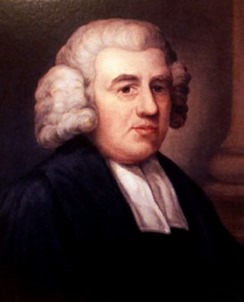For thirty years, John Newton (1725-1807) lived and ministered with a burning conscience, haunted by his former life as a Liverpool slave trader. He had himself subjected screaming slaves to unimaginable torture and thrown overboard the bodies of those who died from disease—at least a quarter of them in each voyage.
Until the 1780s, hardly anyone questioned the buying and selling of slaves. Newton estimated some 50,000 Africans were exported annually to Britain’s slave market. Believing the trade was a staple component of the British economy, the king and Parliament remained silent. In 1787, however, a group of ministers organized the Society for the Abolition of the Slave Trade. Newton saw his chance to speak. Unsolicited, he wrote a tract called "Some Thoughts on the African Slave Trade," a wrenching account of his firsthand experience as a slave ship captain.
The book was published in 1787 and hit London like a bombshell. Prime Minister William Pitt, stricken in conscience by Newton’s description of such inhuman cruelty, appointed a commission to investigate the slave trade. Their work was, in time, a death blow to the nation’s slave economy. Abolition was not immediate, but in 1807, just months before Newton’s death, both houses of Parliament finally passed a measure to outlaw the practice. Here, Newton, states that a nation’s viability depends upon its respect for God’s basic standards of decency; the alternative is ruin. May we also have courage to confront such evils in our own day, upholding the truth and dignity to which God calls his church.
. . . I should think it rather unsuitable to my present character as a minister of the Gospel, to consider the African slave trade merely in a political light . . . [Yet] my character as a minister will allow, and perhaps require me to observe, that the best human policy is that which is connected with a reverential regard to Almighty God, the supreme governor of the earth. Every plan, which aims at the welfare of a nation, in defiance of his authority and laws, however apparently wise, will prove to be essentially defective, and, if persisted in, ruinous. The righteous Lord loveth righteousness, and he has engaged to plead the cause and vindicate the wrongs of the oppressed. It is righteousness that exalteth a nation; and wickedness is the present reproach, and will, sooner or later, unless repentance intervene, prove the ruin of any people . . .
Though I were even sure that a principal branch of the public revenue depended upon the African trade (which I apprehend is far from being the case), if I had access and influence, I should think myself bound to say to Government, to Parliament, and to the nation, “It is not lawful to put it into the treasury, because it is the price of blood,” (Matt xxvii. 6).1
![]()
![]()
Footnotes:
![]()
1 John Newton, The Journal of a Slave Trader (John Newton) 1750-1754, with Newton’s Thoughts upon the African Slave Trade (London: The Epworth Press, 1962), 99-100.





